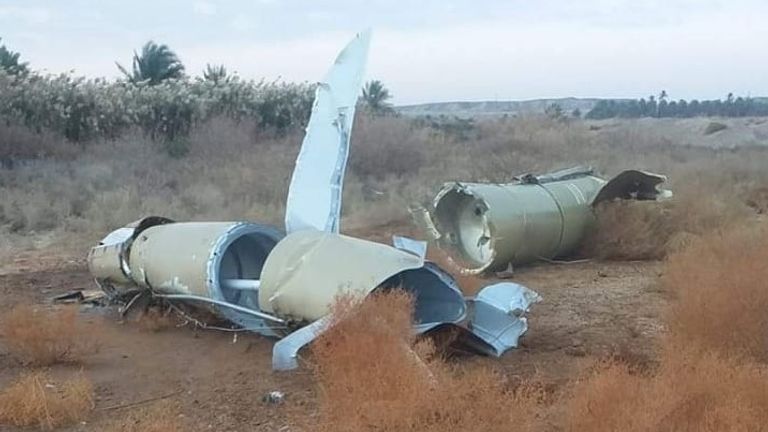Iran fires ballistic missiles at U.S. troops -- beginning or end? UPDATED

Article written by Andrea Witburg in "The American Thinker":
With reports rapidly emerging from Iran and Iraq, there are a few concrete facts:
The Pentagon confirmed Tuesday night that Iran launched “more than a dozen ballistic missiles” into Iraq. Iran targeted Iraqi military bases in Al-Assad and Erbil that are known to host U.S. and coalition troops. The Pentagon further said that there are no U.S. casualties.
This last is an interesting point because Iran has proven in the past that it can direct its ballistic missiles accurately. This may indicate, as is discussed at greater length below, that these missiles are a feint to hide Iran’s ultimate revenge for Soleimani’s death.
White House Press Secretary Stephanie Grisham said President Trump has been briefed and is monitoring the situation but has not yet formally announced a plan of action. Trump himself tweeted out late Tuesday night that he would issue a statement Wednesday morning, as well as saying that all is well:
All is well! Missiles launched from Iran at two military bases located in Iraq. Assessment of casualties & damages taking place now. So far, so good! We have the most powerful and well equipped military anywhere in the world, by far! I will be making a statement tomorrow morning.
These bases have been on high alert due to indications that the Iranian regime planned to attack our forces and interests in the region. As we evaluate the situation and our response, we will take all necessary measures to protect and defend U.S. personnel, partners, and allies in the region.Iran’s Islamic Revolutionary Guard Corps, in addition to taking responsibility for the twelve missiles (which it referred to as “tens of ballistic missiles”), promised repercussions against any countries that hosted American attacks against Iran.
There are also unverified reports that the United States Air Force was immediately in the air and awaiting orders:
More than six US Air Force F-35A Lightning II fighter jets left Al-Dhafra Air Base in the United Arab Emirates at around 2 am Wednesday, according to multiple local Middle Eastern sources, possibly heading to respond to Tuesday night’s Iranian attack on American targets in Iraq.Amusingly, in an example of “monkey see monkey do,” Saeed Jalili, an advisor to Ayotollah Khamenei and a member of Iran’s Expediency Council, mimicked Trump’s American flag tweet after the Soleimani takedown by tweeting out the Iranian flag following Iran’s happily unsuccessful missile strikes:
The warplanes left the UAE just about two minutes after the Ain Al-Asad Air Base came under rocket and missile fire from Iran, and from a local Iranian proxy militia in Iraq.
In
a string of tweets, HuffPost contributor Yashar Ali, who is of Iranian
descent and is a reliable and temperate news source, cautioned against
viewing Iran’s actions on Tuesday as their final say:
Yashar Ali 🐘Verified account @yashar
13h13 hours ago

America
has looked at proportionality through the wrong end of the lens. A
disproportionate attack is dropping an atomic bomb for a failed attempt
to storm the Baghdad Embassy. However, contrary to the Democrat
expectation since Vietnam, a war fought properly is a war fought to
victory – and that means using more force than the enemy. That’s not
proportionate at all; it’s better than proportionate.
President Trump is different from past presidents for he does not believe in proportionality. He believes in winning. Sen. Lindsey Graham, who spoke to Sean Hannity immediately after a telephone call with the President, said Trump made it clear that, if “You continue this crap, you are going to wake up one day out of the oil business.”
UPDATE: Iran actually fired 15, not 12, ballistic missiles, but 25% of them missed their intended targets:
Given Iran's propensity for seeking cold revenges, rather than hot ones, it remains to be seen whether it will conduct a delayed massive bombing strike somewhere in the world. Given President Trump's habit of hitting back twice as hard, it's to be hoped that time quells the Iranian's lust for revenge.
Yashar Ali
🐘 Retweeted Dan Lamothe
1. I want to express this carefully cause I don't want to minimize anything that results in loss of life. But missiles flying back/forth in Mid East is all too common (something US can handle) & not what makes me nervous about the Soleimani situation
Here's what makes me nervous
2. What makes me nervous is illustrated in the WSJ story. The Iranian government has always operated on its own timeline. If you think Iran lobbing missiles over the border is the kind of revenge they ultimately have in mind, you're wrong.
3. Example: In 2012, assassins kill an Iranian nuclear chemist (likely directed by Israel). Iran promises revenge.
Where does the ultimate revenge take place?
A month later in Georgia, India and Thailand where Israeli diplomats are targeted with bombs
4. Example: In 1992, IDF killed the Sec General of Hezbollah
Where did Iran retaliate?
In Buenos Aires with a truck bomb driven into the Israeli embassy. That attack killed 29 people
Another attack two years later took place at the Jewish Community Center killing 85 people

5. Those examples are pretty tight timelines for Iranians. The Iranian gov sees revenge as almost a generational thing...their timeline can be in months/years. Revenge always doesn't come via a show of force they take PUBLIC credit for.
6. So what I'm saying is all these people with their chest thumping, I would be cautious about what you see as Iranian revenge and unfortunately prepare yourselves for the kind of attacks that are unexpected, that don't follow a tight timeline, and show up where you least expect
Yashar Ali
🐘 Retweeted Katty Kay
7. If people think that this is it...that Iran has chosen to retaliate against the US for killing the second most powerful man in Iran, by lobbing some missiles across the border that didn't result in US casualties then I have a bridge to sell you
Ali’s
insight, while important, is predicated upon the fact that, since 1979
America has tried to avoid direct or escalating conflicts with Iran. As
the Democrats’
response to Soleimani’s death shows, any action America takes is
immediately labeled “disproportionate,” a label that has had enough
domestic repercussions to force all presidents but for Reagan (who destroyed a large part of Iran’s Navy in 1988) to back down.
President Trump is different from past presidents for he does not believe in proportionality. He believes in winning. Sen. Lindsey Graham, who spoke to Sean Hannity immediately after a telephone call with the President, said Trump made it clear that, if “You continue this crap, you are going to wake up one day out of the oil business.”
UPDATE: Iran actually fired 15, not 12, ballistic missiles, but 25% of them missed their intended targets:
Ten missiles hit Al-Assad Air Base, one missile hit a military base in Erbil and four missiles failed to hit their targets, according to a U.S. military spokesman for Central Command, responsible for American forces in the Middle East.That failure level again suggests that Iran did not intend its response to Soleimani's death to be an overwhelmingly lethal strike -- although the 11 missiles that did land, which risked killing more Americans on Trump's watch. Iran's foreign minister Javid Zarif identified the missile strikes as "proportionate measures in self defense under Article 51 of UN Charter targeting base from which cowardly armed attack against our citizens & senior officials were launched."
Given Iran's propensity for seeking cold revenges, rather than hot ones, it remains to be seen whether it will conduct a delayed massive bombing strike somewhere in the world. Given President Trump's habit of hitting back twice as hard, it's to be hoped that time quells the Iranian's lust for revenge.





Post a Comment